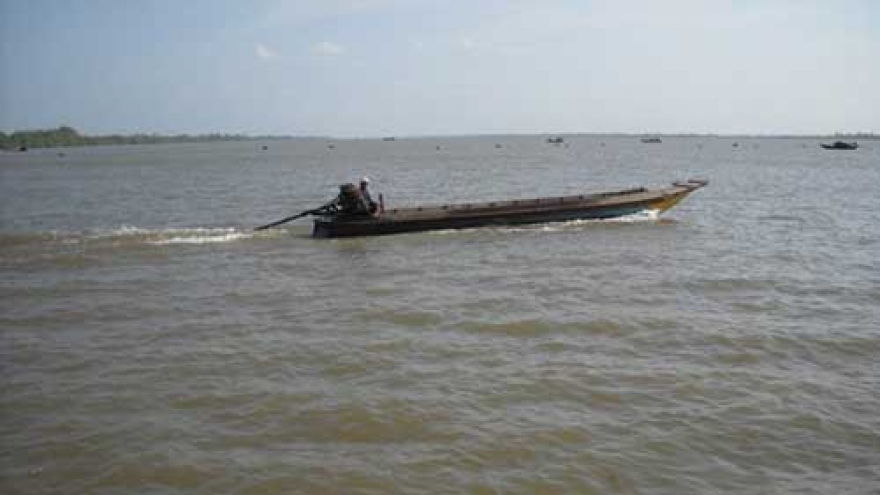Mekong River resources must be shared among Vietnam, neighbours
Le Duc Trung, Chief of the Office of Vietnam National Mekong Committee, spoke to the newspaper Tin Tuc (News) about how to share the Mekong River to the benefit of all regional countries.
Q: Many experts have blamed the high intrusion of salty water into the Cuu Long (Mekong) Delta on climate change and the low level of water running from the upper reach to the lower reach of the Mekong River delta. How do you respond to their arguments?
A: Based on our hydrometereological data and the water level in the Mekong Delta in Southern Vietnam over the past 30 years, I can say that there are two main causes of drought in the Mekong Delta: water coming from the upper reach of the Mekong River (accounting for over 90%) and the rainfalls in the region, plus the use of water in the Delta coupled by impacts from the sea.
This year, the rainfall in the Mekong Delta has been extremely low – a record low in history. No rain was reported in February. As a result, it has seriously affected the water flow in the Mekong River, including the portion running through Vietnam.
The rainfall is low while the demand for water in all countries sharing the Mekong River is high, and Vietnam is situated at the lower end of the river. This has resulted in a serious drought in the Mekong Delta. According the our hydrometerreological data at the Tan Chau and Chau Doc stations on the Tien and Hau rivers, the water levels in these two stations were also at their lowest levels in their log books.
In Vietnam, late March and early April will be the peak of the dry season in Vietnam. So, the situation will become more serious in the next two months.
In addition, poor water regulation among projects in the Mekong basin has contributed to the problem of water scarcity in the lower basin. At present, on the main tributary of the Mekong River, there are already a few Chinese projects and other international projects built on the main tributary.
Due to drought, they don’t discharge water down to the lower end of the river. In addition, Thailand has also built some projects causing the diversion of water in the region. All these activities have rendered the drought in the lower Mekong Delta more serious.
For our Mekong Delta, the low rainfall in January and February coupled with high tides has worsened the intrusion of salty water into the Delta.
 |
Q: Does the Mekong River Commission have conducted any impact assessment of reservoirs on the upper reach of the Mekong River on the region’s socio-economic development?
A: Over the past three years, the Vietnamese Government has assigned the Vietnam National Mekong Committee to conduct studies on the impacts of hydropower plants on the main tributary of the Mekong River in the Mekong Delta Region and the Mekong Delta of Vietnam and Cambodia as a whole. The latest study was completed in December 2015 and sent to the Government.
According to the study, hydropower plants built on the main tributary of the Mekong River and some projects in China’s Yunnan Province have caused serious consequences for the river flow of the Mekong River, particularly in the dry season.
It is the main cause of saltwater intrusion into the Mekong Delta region in Vietnam. In addition, it also has negative impacts on Vietnam’s aqua products and alluvium.
According to the latest report, the volume of aqua products from the Mekong Delta will drop by 50% while the alluvium will drop by 70%. This will seriously affect the local people’s livelihoods, the region and the country’s socio-economic development.
At present, there are three major hydropower plants on the upper reach of the Mekong River: one belonging to China (it is already in operation), and the other two – Don SaHong and Xayaburi - are from Laos and are in the process of being constructed.
Q: In the context of climate change, what should countries sharing the Mekong River do to balance the interests of each nation?
A: All nations have a right to pursue their socio-economic development goals. But during their exploitation of the Mekong River, they should respect international laws and practices, particularly the use of water resources - which was adopted by the UN General Assembly on May 21, 1997 and came into effect in 2014 - and the Co-operation Agreement on the Sustainable Development of the Mekong River in 1995.
As a member of the Mekong River Commission (MRC), Vietnam has regularly exchanged information with Cambodia and Thailand on the use of water on the Mekong River.
In the near future, the MRC will send a letter of request to China to ask it to consider issues related to tapping water from the Mekong River.

